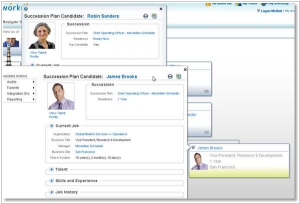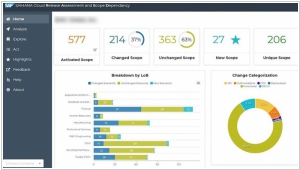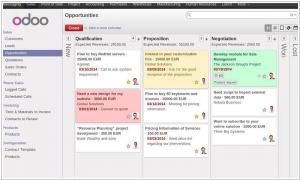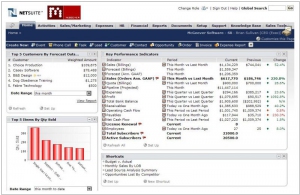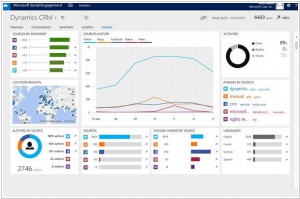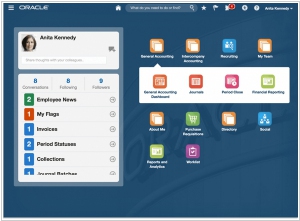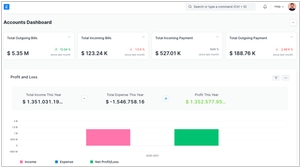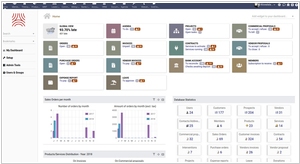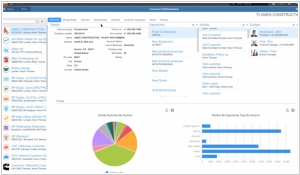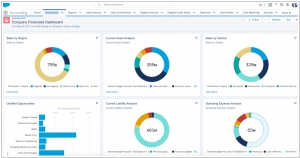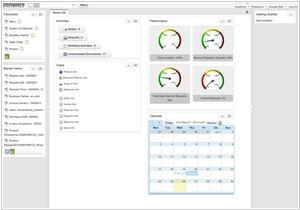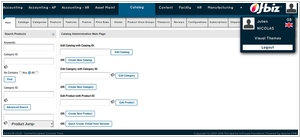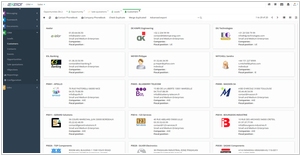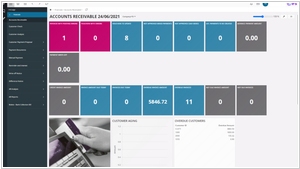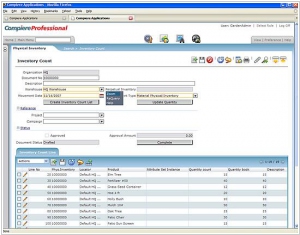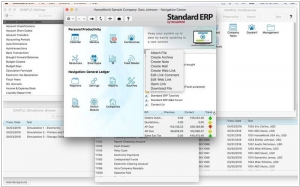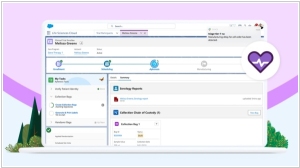Top 10 Online ERP software
February 03, 2024 | Editor: Michael Stromann
27
Online ERP solutions deliver enterprise resource management, human capital management, financial management, and analytics applications designed for large organizations.
1
Workday is a leading provider of enterprise cloud applications for human resources and finance. Workday delivers human capital management, financial management, and analytics applications designed for the world’s largest organisations. Hundreds of companies, ranging from medium-sized businesses to Fortune 50 enterprises, have selected Workday.
2
SAP’s intelligent ERP solutions are the Digital Core that enable businesses to integrate end-to-end cross functional next generation business processes so that companies can become intelligent. SAP's cloud ERP solutions use intelligent technologies to help you grow, innovate, and optimize time and resources – no matter the size of your business.
3
Formerly OpenERP. All-in-one management software. Beautiful. Easy-to-use. From ERP to CRM, eCommerce and CMS. Download Odoo or use it in the cloud. Grow Your Business.
4
NetSuite is the leading vendor of cloud-based Software-as-a-Service integrated business management software for mid-market enterprises and divisions of large companies. NetSuite's cloud business management system including ERP / accounting, order management / inventory, CRM, professional services automation (PSA), and Ecommerce.
5
With intelligent business applications across CRM and ERP, Microsoft Dynamics 365 gives you choice. Start with just what you need to run your business—and delight your customers. And then add apps as your needs change.
6
Sage Business Cloud is the right, proven solution for mid-market customers with international ambitions and multi-national requirements. Sage Business Cloud technology is available on all leader platforms in the market with End-to-end process integrity and data consistency in your Webtop across the enterprise.
7
Oracle Enterprise Resource Planning (ERP) Cloud is a suite of cloud applications for finance, project management, procurement, risk management, and other core day-to-day activities important in every business, regardless of size, industry, or geography. Designed from the ground-up with a modern architecture and technology, Oracle ERP Cloud is natively connected with all Oracle enterprise cloud applications and scales inherently to support added users, transactions, and sites as your business grows by size and into new markets across your country or the globe.
8
ERPNext is the world's best free and open source ERP. Complete, versatile and powerful. Designed for both, simplicity and power
9
Open Source ERP & CRM for business. Whatever your needs are (Customer Relationship Management, Sales, Human Resources, Logistics, Stock, Invoicing, Accounting, Manufacturing, Marketing, Foundation Management, Surveys, ...), you can setup the application to match your needs...
10
Cloud SMB and Enterprise ERP software for industries including Manufacturing, Healthcare, Retail, ... Our cloud-first strategy provides our customers with deep industry insights, faster time to value, and scalable innovation
11
FinancialForce cloud ERP is a comprehensive and innovative financial management system that takes a fresh approach to a traditional business function. This online accounting application combines the power of the Force.com cloud with a groundbreaking accounting system design. FinancialForce Accounting is native to Salesforce CRM.
12
iDempiere is a powerful, Tier II, open-source ERP/CRM/SCM system supported by a skilful community. The project focuses on high-quality software, a philosophy of openness and its collaborative community that includes subject matter specialists, implementors, developers and end-users.
13
Apache OFBiz is a suite of business applications flexible enough to be used across any industry. A common architecture allows developers to easily extend or enhance it to create custom features.
14
Implement a powerful ERP to centralize all your data in a single business suite. The versatility of the Axelor platform makes it one of the best alternatives to traditional ERPs. Axelor integrates all the functionalities of the ERP markets, with the added advantage of being user-friendly and modular. Cloud version available.
15
Sweden-based enterprise software solution provider, IFS develops and delivers ERP, EAM, FSM and ESM to businesses worldwide. From cloud technology to easy-to-use interfaces, our solutions are for customers who maintain assets, manage service operations, or manufacture and distribute goods.
16
Compiere Enterprise is a modern, highly adaptable, enterprise-class business solution - that can be deployed on-premise or on the Cloud - for a fraction of the cost of traditional ERP systems. Improve agility and dramatically lower cost of ownership with Compiere.
17
HansaWorld is an award-winning business management software for small and medium companies. It's an Integrated Business Platform (IBP) for managing all of your business processes - ERP, CRM and more.
Latest news about Online ERP software
2023. Series, which aims to replace ERP systems, lands $25M
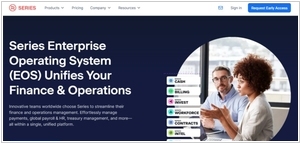
Series, a startup in the realm of software development aiming to streamline and automate the financial and operational aspects of businesses, has successfully secured $25 million in funding. Unlike traditional ERP systems known for their complex deployment and management, Series distinguishes itself through a modular approach. This enables customers to selectively adopt desired functionalities rather than being obligated to invest in an entire system. Recognizing that different companies have distinct needs depending on their stage, Series provides a menu-like platform with separate web apps and products. This flexibility allows users to construct tailored solutions, choosing features relevant to their current requirements. Series encompasses a comprehensive array of ERP-like features, spanning payroll and benefits coordination, contract lifecycle management, business-to-business payments, and treasury management to handle aspects of a business's cash flow and liquidity.
2022. Chinese ERP startup Dianxiaomi raises $110M
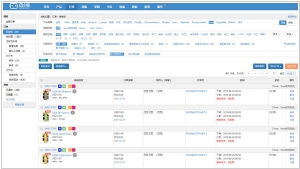
Dianxiaomi, a startup that develops software enabling Chinese exporters to streamline their product selection and sales strategies, has successfully raised $110 million in Series D funding. Dianxiaomi offers an enterprise resource planning (ERP) software suite designed specifically for Chinese vendors operating on platforms like Wish, Amazon, eBay, AliExpress, Shopee, Lazada, and others. The target audience comprises small and medium-sized sellers who manage up to 5,000 orders daily. In addition to its domestic operations, the SaaS provider is expanding its presence internationally. It has introduced localized ERP products for sellers in Southeast Asia and Latin America, respectively. Dianxiaomi claims to serve approximately 1.5 million users globally and has established partnerships with around 50 e-commerce platforms. In Southeast Asia alone, it boasts a user base of 430,000 sellers who are actively participating in the thriving regional market.
2022. Open-source/cloud ERP provider Axelor raised €10M
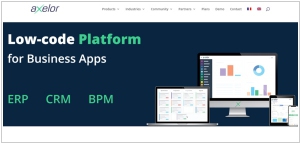
Axelor, a company specializing in open-source, low-code BPM (Business Process Management), has secured €10 million in Series A funding. The company offers a comprehensive platform for developing fully-featured ERP (Enterprise Resource Planning) and CRM (Customer Relationship Management) applications. With over 1,000 tools and a growing customer base that includes notable names such as PSA, Ministère de la justice, Hauts-de-seine, and Trenitalia, Axelor has established its presence in the market. The company provides its solution under both an open-source license and a commercial license. Unlike its Belgian-based competitor Odoo, Axelor's approach empowers organizations to create modules using the low-code platform, reducing reliance on traditional code-based development methods.
2021. Microsoft announces new tools to modernize supply chain and manufacturing
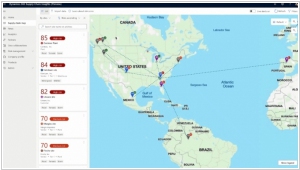
Microsoft is introducing the Microsoft Cloud for Manufacturing, a new solution tailored for the manufacturing industry. Additionally, they are launching Dynamics 365 Supply Chain Insights, a tool that enhances supply chain visibility and provides intelligence to address issues proactively. The manufacturing cloud aims to gather signals and alert manufacturers about potential supply shortages, while the Supply Chain Insights tool helps identify and resolve issues along the supply chain before they become bottlenecks. Together, these solutions enhance agility and flexibility for manufacturing companies.
2021. xentral, an ERP platform for SMBs, raises $75M
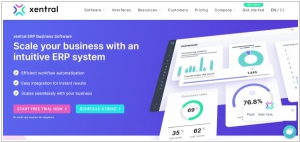
xentral, a startup from Germany specializing in developing ERP solutions for online small businesses, has successfully raised $75 million in Series B funding. The company offers a range of services including order and warehouse management, packaging, fulfillment, accounting, and sales management. Currently, the majority of its 1,000 customers are based in Germany, including prominent direct-to-consumer brands such as YFood, KoRo, the Nu Company, and Flyeralarm. xentral seamlessly integrates with popular platforms like Shopify, eBay, Amazon, Magento, WooCommerce, and CRM systems like Pipedrive, consolidating all the software functionalities into a unified platform. The aim is to automate these processes in the background, allowing companies to focus on their core operations. xentral's goal is to empower business owners to implement and configure their flexible ERP solution over the weekend, ensuring it is ready for their team to utilize on Monday.
2021. IFS Launches IFS Cloud
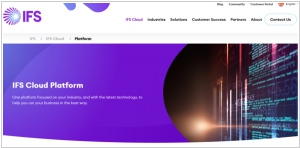
IFS has introduced IFS Cloud, a unified platform that seamlessly integrates all of its products to provide comprehensive capabilities for managing customers, personnel, and assets. This platform enables customers to choose between deploying best-of-breed solutions or harnessing the power of interconnected value chains across various functionalities, including enterprise resource planning (ERP), customer relationship management (CRM), human capital management (HCM), asset management (EAM), and field service (FSM). With IFS Cloud, the company delivers a distinctive technology platform that offers a unified user experience, a standardized data model, and consistent support services. IFS Cloud brings simplicity, flexibility, and innovation to organizations seeking to adapt to new business models, optimize costs, expand rapidly, and enhance customer service. By adopting IFS Cloud, companies can easily scale their operations and seamlessly activate new functionalities, such as additional modules or innovative capabilities, when the timing aligns with their business requirements.
2021. Katana raises $11M to be the SaaS powering manufacturing entrepreneurs
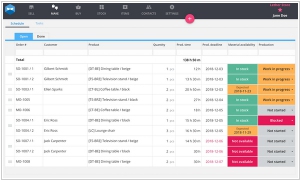
Katana, a startup based in Estonia, has secured $11 million in Series A funding for its manufacturing-specific enterprise resource planning (ERP) software designed for small and medium-sized businesses (SMBs). Katana positions itself as the ultimate tool for entrepreneurial manufacturers, offering a plug-and-play ERP solution. Its goal is to help companies transition from outdated tools like spreadsheets and legacy software for inventory and production management. The startup is also capitalizing on macro trends such as the rise of online marketplaces and direct-to-consumer (D2C) e-commerce. These trends have led to a surge in independent makers spanning various industries, including cosmetics, home décor, electronics, apparel, and food and beverages.
2021. Xentral nabs $20M to help online-facing SMBs run back offices better
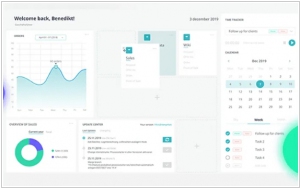
Xentral, a German startup specializing in enterprise resource planning software, has recently secured $20 million in Series A funding. The company's comprehensive platform caters to the back-office needs of online small businesses, encompassing functions such as order and warehouse management, packaging, fulfillment, accounting, and sales management. While Xentral boasts a customer base of 1,000 businesses primarily in Germany, including prominent direct-to-consumer brands like YFood, KoRo, the Nu Company, and Flyeralarm, its challenge lies in expanding its reach to attract more businesses and demonstrate the value of its provided tools. Competition in the market segment of developing ERP solutions for small businesses, which includes players like Sage, NetSuite, and Acumatica, further intensifies the landscape.
2020. Microsoft introduced its customer data platform inside Dynamics 365
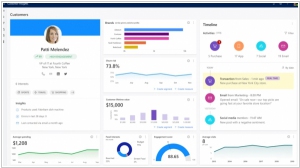
Microsoft has made a significant announcement regarding its Dynamics 365 product line, in response to the growing volume of enterprise data and the need to collect and analyze it effectively to enhance customer experiences. The company is introducing new features to its customer data platform (CDP), a concept that has gained traction among major vendors and a growing number of startups. The CDP consolidates customer data from various systems into a single location, simplifying the understanding of customer interactions. The ultimate objective is to leverage this knowledge to deliver enhanced customer experiences. Microsoft's CDP is known as Customer Insights. It is important to note that Microsoft is not the only player in this domain. Other prominent companies like Adobe, Salesforce, and SAP offer similar products for similar reasons, as part of their marketing toolsets.
2020. Koch Industries acquires Infor ERP for $13B
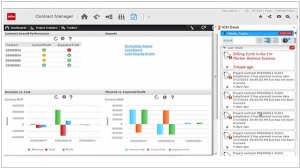
Infor, a leading provider of large-scale cloud ERP software, has recently announced its acquisition by Koch Industries for a staggering $13 billion. Koch Industries, which already served as a significant customer and lead investor in Infor, made the strategic decision to retain the ERP vendor as a private entity. With its extensive global presence, spanning diverse industries across 60 countries, Koch brings valuable resources, expertise, and industry relationships to support Infor's continued growth and innovation. Despite being relatively under the radar, Infor is a major player in the industry, boasting a workforce of over 17,000 employees and serving 68,000 customers across more than 100 countries. In 2018 alone, Infor's expansive customer base generated an impressive $3 billion in revenue.
2019. Workday to acquire online procurement platform Scout RFP for $540M
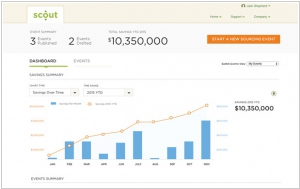
Workday has recently finalized an agreement to acquire Scout RFP, an esteemed online procurement platform, for a significant sum of $540 million. This strategic acquisition serves as a valuable expansion to Workday's existing procurement solutions, namely Workday Procurement and Workday Inventory. Workday is dedicated to becoming a comprehensive, all-encompassing player in the cloud back-office arena, and addressing the gap in procurement has been one of their major priorities. As part of their broader vision for the future of Cloud ERP, Workday strategically invests in portfolio companies that complement their core offerings. In today's definition of ERP, various essential components such as finance, HCM (human capital management), projects, procurement, supply chain, and asset management are included, and Workday is committed to delivering a holistic solution covering these key areas.
2017. Workday acquired CRM startup Pattern
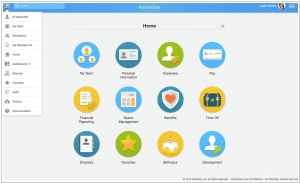
Financial management and HR software vendor Workday has recently acquired Pattern, a startup based in Redwood City, California. This move positions Workday as a competitor to Salesforce and other similar alternatives. Pattern, a two-year-old company, focused on streamlining customer relationship management for sales professionals. The startup received funding from Felicis Ventures, SoftTech VC, First Round Capital, and several angel investors, with a seed funding round of $2.5 million in the previous year. Workday has a history of strategic acquisitions, including the purchase of big data analytics vendor Platfora and the online learning company Zaption, both in the same year. The specific terms of these acquisitions were not disclosed.
2017. Sage Group buys cloud ERP software Intacct
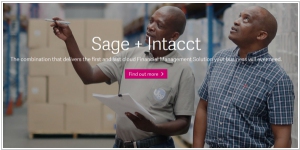
The Sage Group, a British enterprise software company, has announced its acquisition of cloud ERP provider Intacct for $850 million. Intacct, which competes with Financial Force, Oracle's NetSuite, and other similar solutions, revealed that it currently serves 11,000 customers with its enterprise resource planning software. Sage Group, renowned for its cloud accounting and ERP software, views this acquisition as a means to drive organic growth by attracting new customers on a larger scale. Additionally, it further strengthens Sage Group's comprehensive suite of cloud solutions, aligning with its cloud-first acquisition strategy.
2016. Oracle buys cloud ERP provider NetSuite for $9.3B
Oracle has announced its acquisition of NetSuite for an estimated amount of $9.3 billion. As per a statement by Oracle CEO Mark Hurd, both Oracle and NetSuite's cloud service offerings, targeting enterprise customers, will continue to operate and coexist in the marketplace indefinitely. NetSuite, an established player in the cloud enterprise resource planning (ERP) sector, holds a prominent position with its offerings for supply and demand tracking, inventory management, accounting, customer relationship management (CRM), and HR solutions. The ERP industry has witnessed considerable mergers and acquisitions along with consolidation in recent years. Oracle, known for its aggressive acquisition strategy, has been actively acquiring smaller companies throughout 2016, including Opower and Textura.
2015. Workday is going to fund machine learning startups
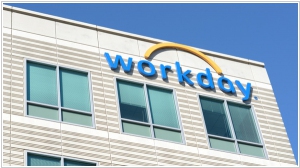
Workday, the provider of finance and human resources SaaS software, has introduced Workday Ventures, a new initiative focused on investing in startups that specialize in machine learning. The program aims to support 10-12 companies this year and has already provided funding to various ventures, including Thinair (a security service), Unbabel (an online translation tool), Metanautix (a company developing tools for analyzing big data), and Jobr (a mobile job search and application tool). Workday is particularly interested in collaborating with early-stage startups that prioritize machine learning. Unlike traditional venture capital firms, Workday's approach to Workday Ventures is strategic rather than purely driven by financial goals.
2015. FinancialForce cloud ERP raises $110M to take on SAP and Oracle
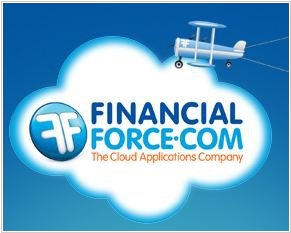
FinancialForce, the cloud-based ERP solution built on the Salesforce1 platform, has announced a successful funding round, securing an additional $110 million in investment. As the cloud computing industry continues to mature, we are witnessing a growing trend of back-office functions, such as ERP, transitioning to the cloud and gaining significant traction. Traditionally, this market has been dominated by established players like SAP, Oracle, and Microsoft. However, cloud-based providers like FinancialForce and NetSuite are starting to make their presence felt. FinancialForce, in particular, stands out as an intriguing player in the field. While it positions itself as the logical ERP choice for Salesforce customers, it has also established itself as a strong offering in its own right. Leveraging the capabilities of Force.com, FinancialForce not only integrates seamlessly with Salesforce but also provides a credible and independent ERP solution.
2014. Oracle E-Business Suite unveiled cloud-centric apps
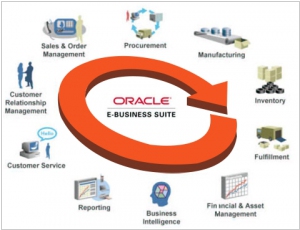
Oracle has recently updated its ERP solution, E-Business Suite, with enhanced integration with the company's cloud services and improved tablet compatibility. The Financials module now integrates with Oracle Revenue Management Cloud, allowing users to take advantage of the revenue compliance and recognition benefits offered by that product. Furthermore, enhancements in Project Contracts and Project Billing enable U.S. federal contractors to optimize cash flow, increase transparency, and automate billing processes. The Purchasing module has also received improvements to enhance buyer productivity when handling large orders. These changes include the introduction of Web ADI-enabled spreadsheet creation and modifications to purchase order lines, schedules, and distributions. Web ADI, also known as Applications Desktop Integrator, is Oracle's tool for integrating its applications with Microsoft Excel.
2013. SAP makes big companies effective with Big Data. Competitors are crying
In recent years, SAP was probably the least innovative IT giant (compared to competitors Oracle, Microsoft, IBM). All SAP's own innovative projects mostly failed (remember Business ByDesign), and the only thing that SAP could do - is buying other companies (SuccessFactors, SyBase, Ariba). But at this time, SAP is going to outdo all the competitors on the wave of new trendy technology - Big Data. What is Big Data? ***
2012. CDC Software and Consona unite into one company - Aptean
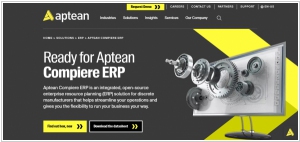
Hong Kong-based CDC Software, a hybrid enterprise software provider offering both on-premise and cloud deployments, has merged with Indianapolis-based Consona Corp. to create a new entity called Aptean. With over 10,000 customers in 50 countries, CDC Software brings its expertise to the combined organization. Aptean, now headquartered in Atlanta, boasts a customer base of more than 9,000 and a global network of sales and support operations with 1,500 employees. This merger brings together Consona and CDC's complementary solutions in crucial application areas such as customer relationship management (CRM), enterprise resource planning (ERP), and supply chain management (SCM).
2012. Consona acquired open source ERP software provider Compiere
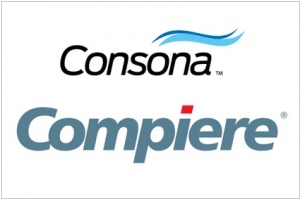
US enterprise software company Consona has recently acquired Compiere, a leading on-demand ERP (enterprise resource planning) vendor. This strategic move allows Consona to establish its presence in the realm of cloud computing. Compiere stands out in the ERP industry as it offers both cloud-based functionality and operates on an open-source model, although it does have comparable counterparts like OpenBravo. With a primary focus on distribution, Compiere's software complements Consona's existing products designed for small to mid-sized discrete manufacturers. According to a statement, Consona intends to uphold and advance the development of Compiere's product portfolio, which currently serves around 130 customers. Furthermore, Consona is committed to supporting Compiere's open-source strategy, ensuring continuity for its user base.
2012. SAP became NetSuite's customer. Business ByDesign will be closed
Most of all NetSuite loves trolling its rival - SAP. From time to time they organize anti-SAP conferences, marketing campaign a la Business ByNetsuite and produce videos like that one above. And they haven't missed the opportunity to joke on SAP at this time. At the opening of the conference SuiteWorld, Zach Nelson (CEO of NetSuite) took the stage and announced that in the past year the company has achieved their biggest ever win: ERP-giant SAP has become NetSuite's customer. The audience was shocked, and then Zach explained. ***
2011. Google Wallet: How it works
Today, Google has launched a new service - Google Wallet, which allows to pay for goods in stores with the help of a smartphone. Of course, it's more the future than the present technology even in US. But it's interesting to see how we'll pay in the future. For a user Google Wallet is a mobile application that is installed on a smartphone. In this application you enter your bank card details (or get a card directly from Google) and add your loyalty cards. Then, with your smartphone you go to the store and when approaching the point of sale, launch the Google Wallet application, enter your PIN-code, select a card, tap the terminal with your smartphone, and ... your money fly to the retailer. ***
2011. Transifex - online service for app translation
If you want to sell your business application (or service) on the European market, you need to translate the interface to at least 5-6 major European languages. Of course you can hire a professional translator to do this job, but if the translator doesn't understand your app and doesn't use it - he'll hardly make a good translation. It's ideal when the translation is done by the app users themselves. But there are also many problems with this option. For example, how to combine multiple translations from different users, or how to update the translation for the new version if the old translator disappeared. Fortunately, there are special crowd-sourcing translation services for such cases. And Transifex is one of the best of them. ***
2011. Microsoft Dynamics AX 2012 adds cloud services

MBS President, Kirill Tatarinov (at the left) plays with Dynamics AX 2012 via Kinect ***
2011. CloudBudget - No-consulting budgeting solution on Force.com
CloudBudget - is an online budgeting start-up that allows small and medium companies plan their financial incomes and expenses. Usually excel is used for this purpose, but CloudBudget makes the budgeting process easier, faster and eliminates errors that usually follow excel calculations. In addition, it greatly facilitates the financial planning for geographically distributed companies. The service is built on Force.com platform and in the Salesforce style - note the "No Consulting" sign in the video. Unlike most competing SaaS-products (for example, Adaptive Planning) CloudBudget does not require involvement of consultants in the budgeting process. It provides a simple questionnaire on business language, that allows automatically adapt the system to individual business and industry knowledge base (for professional services, telecoms, hi-Tech, construction). ***
2010. Cisco also jumps into Social CRM
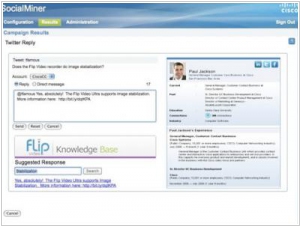
Cisco has never developed CRM systems. Besides, Cisco is in good relations with Salesforce and even resells this CRM system to its customers. But it seams that now the IT giants want to jump into all hot markets, such as Social CRM. So Cisco has unveiled its social CRM system - SocialMiner. Like the other solutions of this class, it can monitor Facebook, Twitter, LinkedIn and other social networks for mentioning of company name or its products. Users can create multiple campaigns, select the keywords and the system will provide daily search results, new "social contacts" and analytical reports. You can not only view and analyze what people are saying about your company on the Internet, but also engage in the discussions with "social contacts" - respond them directly from SocialMiner. ***
2010. Who says Enterprise Software isn’t Cool? Watch what its users can do!
In addition to focusing on new business applications and modern trends in Enterprise software, we also pay attention to how vendors promote themselves and their products. This area is shifting towards the Enterprise 2.0 style, where traditional PowerPoint presentations and image-less PDF brochures are being replaced by captivating blockbusters and show-projects. Instead of mundane descriptions, we now encounter humorous sketches illustrating the consequences of running a business without the software. Such marketing strategies grab attention and, most importantly, foster a sense of affinity towards the software, even if the software itself is not particularly user-friendly, as is the case with SAP. SAP's latest show-project, Run Better, focuses on showcasing the remarkable achievements of its users rather than emphasizing the ERP system itself. Additionally, other examples of captivating marketing can be found from Box.net, Mainsoft, and NetSuite.
2010. Microsoft plans to provide Dynamics ERP as SaaS service
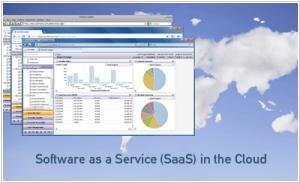
Michael Park, Corporate Vice President of Microsoft’s Business Solutions team, shared some plans about the future of company's SaaS suite Microsoft BPOS. BPOS (Business Productivity Online Services) currently includes MS Exchange Online, MS SharePoint Online, MS Office Communications Online and Office Live Meeting. And Microsoft is going to add Dynamics CRM and Dynamics ERP to this package. While it's no surprise with CRM (Microsoft has been providing the SaaS version Dynamics CRM Online for quite a long time), the SaaS ERP from Microsoft - is something new. Today some Microsoft partners are already providing vendor's ERP solutions as hosted services, but Microsoft never told about the release of the own SaaS ERP version. ***
2010. SAP Business ByDesign goes live
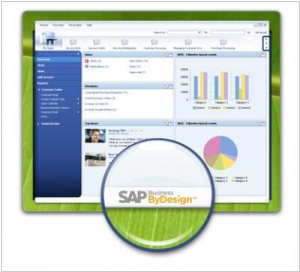
Finally, SAP has officially launched its SaaS ERP system, SAP Business ByDesign, which will compete with NetSuite, Workday and other cloud ERP solutions. As you know, it's not a fresh product. It was released 3 years ago, but due to the scalability problems, its sales were stopped, and still the system was used by fewer than 100 companies worldwide. SAP Business ByDesign is designed for SMB (50-500 employees) and primarily for manufacturing and professional services industries. It's a single multitenant service to automate all business areas, including manufacturing, financials and sales. The updated version SAP Business ByDesign 2.5 provides support for mobile devices, integration with MS Excel, custom forms and user interface based on Silverlight. But its pricing will hardly cause a revolution in SaaS sphere. ***
2010. SAP acquired Sybase to get the cloud database and mobile apps

The world's largest enterprise software vendor, SAP has become even more large. For $5.8 billion SAP has acquired Sybase, the company primarily known as one of the leading database and enterprise mobile applications vendor. Until now, SAP didn't have its own database and provided customers a freedom of choice in this matter. At the same time SAP was reselling about a billion dollars worth of Oracle databases - a bad idea considering SAP and Oracle are in direct competition. However, it is unlikely that Sybase database will replace all other database middleware in the traditional SAP ERP deployments. On the other hand, it can be very useful for cloud deployments and creation of the own SaaS platform for SAP Business ByDesign. Because Sybase has recently released the cloud version of its database, which is primarily designed for Amazon EC2. ***

